The Role of Pet Birds in Our Lives and Well-being
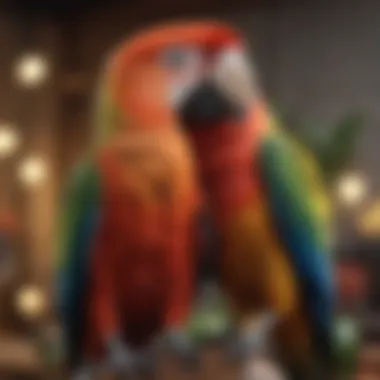
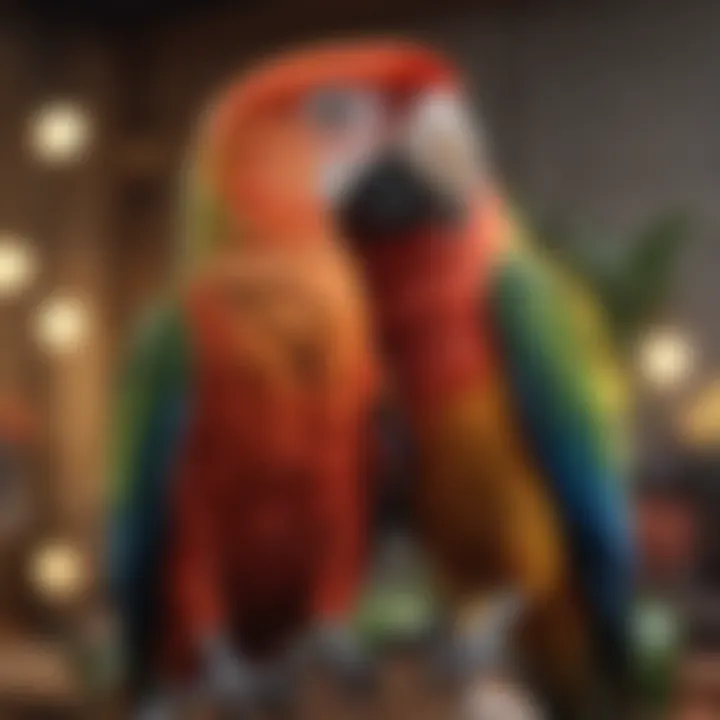
Intro
Pet birds have captured the imagination and affection of people all around the world. For those who have formed bonds with these feathered companions, it is clear that the connection is more than just a hobby. It's a relationship steeped in emotional richness and responsibility. Whether you're considering adding a bird to your family or already enjoy the company of these remarkable creatures, understanding their significance in our lives is essential. This exploration will delve into various aspects, shedding light on the joy and complexity that comes with pet bird ownership.
Avian Care Basics
Taking care of a pet bird involves more than just feeding them. It requires an understanding of their specific needs and characteristics, which can vary drastically from one species to another.
Importance of Proper Nutrition
Feeding birds a balanced diet is crucial. A varied menu includes seeds, fruits, vegetables, and in some cases, specially formulated pellets. For instance, while millet is often a favorite among budgies, cockatiels might thrive on a different mix. Adequate nutrition contributes directly to their health and vitality.
Understanding Bird Species and Their Needs
Not all birds are created equal. The needs of a canary differ vastly from those of an African grey parrot. It's imperative to research and cater to the specific requirements, such as social interaction levels and environmental conditions. This knowledge shapes a better living environment, leading to happier and healthier birds.
"Every bird is unique, but their spirits soar high with proper care."
Basics of Birds Habitat Setup
Creating a comfortable and stimulating habitat is key. Birds need space to fly, perches for resting, and toys to keep them engaged. The placement of the cage matters too; it should be in a lively part of the home, allowing interaction while ensuring safety from potential hazards.
Grooming and Hygiene Tips
Regular grooming is not just about aesthetics; it’s about health. Regular baths help keep feathers clean and can provide an opportunity for bonding. Additionally, trimming nails and beaks, when necessary, prevents discomfort and health issues.
Interacting with Your Pet Bird
Interaction is the heart of building a meaningful relationship with your feathered friend. The way you connect and communicate can make or break this bond.
Building Trust and Connection
Establishing trust begins with patience. Spend time near your bird without forcing interaction, allowing them to come to you on their terms. Gradually introduce hands, offering treats as a peace offering.
Training Techniques and Tips
Positive reinforcement is effective. Using rewards, such as treats or praise, encourages desired behaviors. For example, teaching your bird to step up can be a fantastic starting point in building rapport.
Fun Activities for Bird Owners and Their Birds
Birds are playful creatures. Activities can range from simple games like hide and seek, where you can hide treats for your bird to discover, to more structured training sessions. Engaging in these activities not only provides mental stimulation but also strengthens your bond.
Recognizing Bird Cues and Behaviors
Birds communicate through body language and vocalizations. Understanding these cues—like head bobbing or soft chirps—can tell you a lot about their emotional state and needs.
Emotional Well-Being of Birds
Emotional health is as important as physical health. Birds are social by nature, and understanding their emotional needs greatly improves their quality of life.
The Role of Play and Socialization
Playtime is not a luxury; it’s a necessity. Birds thrive on social interaction, whether with humans or fellow birds. Providing toys and opportunities for social play fulfills their psychological needs.
Enhancing Birds' Emotional Health
An enriched environment boosts mental well-being. Rotate toys regularly, provide them with things to chew on, or even let them explore a safe area outside the cage. This stimulation helps prevent boredom and ensuing behavioral problems.
Assessing Bird Stress and Remedies
Birds can experience stress from environmental changes, lack of interaction, or health issues. Signs include feather plucking or aggressive behaviors. Address the causes promptly to restore peace and comfort.
Building Strong Human-Bird Bonds
Daily interactions are vital. Spend quality time talking to, playing with, and otherwise engaging your bird. Building this connection fosters trust, leading to a more harmonious coexistence.
Bird Health and Safety
A responsible bird owner is vigilant about health and safety concerns.
Common Health Issues and Prevention
Birds can suffer from illnesses like respiratory issues or infections. A clean habitat and routine veterinary visits help catch problems early. It’s essential to know the signs of common issues so that you can seek timely intervention.
Routine Veterinary Care
Regular check-ups with a vet who specializes in avian medicine are crucial. An ounce of prevention goes a long way. Setting up an annual schedule ensures their health is monitored regularly.
Environmental Hazards to Avoid
Common household items can pose threats. Things like non-stick cookware, certain plants, and even some cleaning agents can harm birds. Educating yourself about these hazards ensures a safer home for your avian friend.
Signs of Illness or Distress
Watch for subtle changes in behavior, such as changes in vocalization, appetite, or energy levels. Understanding these signs helps you act quickly, keeping your bird healthy and thriving.
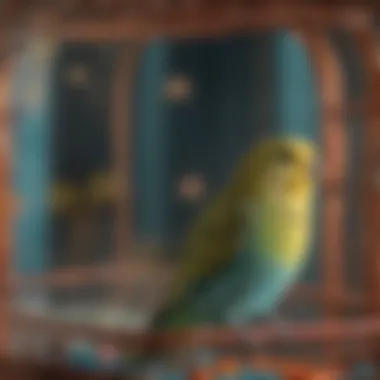
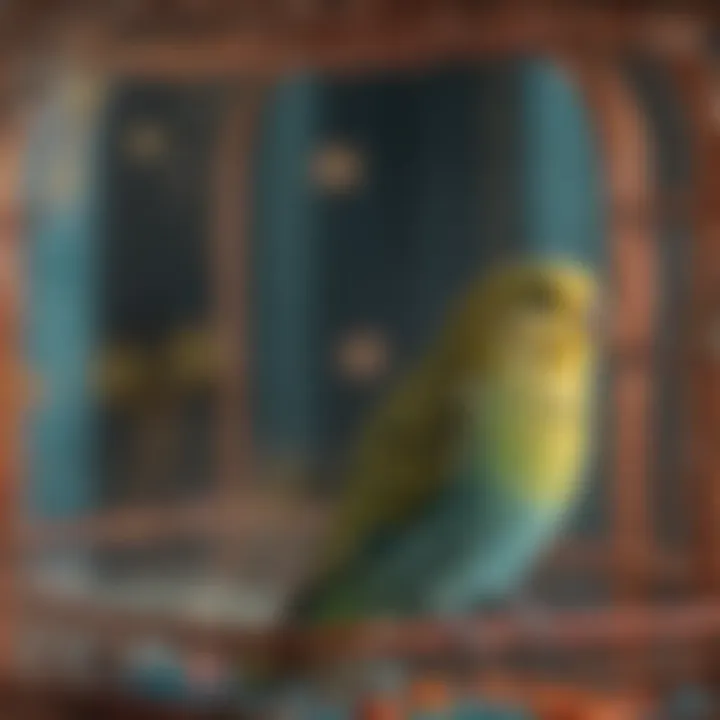
Fun Facts and Quirky Insights
Birds are fascinating creatures with rich histories and traits.
Unique Traits of Popular Bird Species
From the impressive mimicry of the African grey parrot to the joyful antics of the cockatiel, different species bring unique characteristics. Discovering these can enhance appreciation and care.
Historical and Cultural Significance of Birds
Birds have played significant roles in many cultures—symbols of freedom, messengers of the gods, and even popular companions to monarchs. Learning about these historical and cultural aspects adds depth to their appreciation.
Famous Bird Owners and Their Stories
Many public figures have had memorable relationships with birds. For example, John Lennon and his love for exotic birds showcase how these creatures can leave a mark across generations, elevating their status as beloved pets.
By understanding and implementing these insights into the care of pet birds, owners can cultivate a fulfilling and mutually beneficial relationship that lasts a lifetime.
The Unique Bond Between Humans and Birds
The relationship between humans and pet birds is one full of depth, color, and unique experiences. It's not merely about owning a pet; rather, it's an intricate web of emotions, shared moments, and profound understanding. Birds, with their vibrant personalities and captivating behaviors, have carved a niche in human hearts. Their feathered friendships provide companionship, introduce emotional well-being, and offer life lessons that resonate far beyond the confines of their cages. The significance of this bond deserves careful exploration.
Emotional Connections
When we think about pets, the emotional ties that bind us often come to mind. Birds, even from a distance, exude an enigma that draws humans near. People may not immediately realize that the chirping melodies and playful antics of pet birds can stir genuine feelings of affection and attachment.
These dedicated creatures respond to our moods in a way that can feel profoundly personal. For instance, a parakeet may sing a lively tune when you’re in high spirits, but when you’re down, it might perch close and emit softer sounds, providing solace in its own special way. Such interactions foster a sense of bond that extends beyond verbal communication. The non-verbal exchanges create a dialogue steeped in emotional currency, reminding us of the breadth of feelings we can experience together.
Companionship and Loneliness
For many, the world can be a lonely place, but the presence of a pet bird can shed light on even the darkest days.
A little cockatiel perched on the shoulder can be a constant companion. To individuals living alone or those dealing with social isolation, a feathered friend offers a sense of belonging. The familiarity of their routines—whether it be the soft rustling of wings or the occasional quiet whisper—can transform lonely moments into precious memories.
Many bird owners report that their pets have, in fact, become integral parts of their daily lives. They celebrate milestones together, witness the humdrum of everyday life unfold, and help navigate challenges collectively. These seemingly simple moments highlight the profound impact birds have on human experiences of belonging and connectedness.
Impact on Mental Health
An often-overlooked aspect of having a pet bird is the positive influence they have on mental well-being.
Research suggests that interacting with pets can reduce stress and anxiety, and birds, with their engaging behaviors, can serve as natural mood enhancers. For example, watching a lovebird play with a toy or engage in preening can distract from stressful thoughts, providing a mental break. The routine of caring for a bird—from feeding to cleaning—also instills a sense of purpose that can be particularly beneficial to those grappling with depression or anxiety.
"The gentle fluttering of a bird's wings can echo the soothing rhythm of one's own heartbeat, reminding us that life is alive, even in small moments."
Moreover, the anticipation of their antics can lead to joy, while their unpredictable behaviors can spark laughter and wonder. Each interaction—be it a playful nibble or a sweet whistle—becomes part of a larger, fulfilling narrative. The presence of birds can serve as gentle reminders that companionship, no matter its form, is a vital ingredient in the journey of life.
In summary, the bond between humans and birds transcends simple ownership. It's a profound connection that nourishes the soul, challenges the heart, and teaches invaluable life lessons. Understanding this relationship not only deepens appreciation for these pets but also illuminates the shared path we walk together.
Pet Birds as Teachers
Pet birds offer invaluable lessons that extend beyond the scope of mere companionship. They serve as remarkable educators, teaching us about responsibility, observance, and patience—qualities that enrich the livs of those who choose to keep them. Their ability to engage with us in such simple yet profound ways highlights their importance in our daily lives. This section delves into the different facets of this aspect of pet bird ownership, focusing on how they can shape us as individuals and better equip us for various life's challenges.
Learning Responsibility
Owning a pet bird is not just about having a colorful presence flitting around your home; it’s a commitment that requires a significant investement of time and attention. From ensuring their cages are clean to providing a balanced diet, the myriad tasks involved in caring for a bird teach responsibility in a hands-on way. This responsibility becomes a routine, which instills organizational and caregiving skills.
- Daily Feeding: A pet bird thrives on a set eating schedule. This necessitates consistency, urging owners to unlock their routines early each day.
- Health Monitoring: Owners learn to observe behavioral changes or signs of illness that require immediate attention. Recognizing these signs can often be the difference between a quick recovery and a serious health issue.
- Social Interaction: Many bird species, like parakeets and cockatiels, flourish on social interaction. Being responsible for their well-being means undertaking the effort to connect with them, thus enhancing both your ability to nurture cross-species relationships and develop empathy.
In becoming better caregivers, bird owners often reflect on their responsibilities in other aspects of life, illustrating how this commitment can transfer to different roles, be it personal or professional.
Observing Behaviors and Habits
Birds, while small and seemingly simple creatures, offer a wealth of insight into behavior and habits that can translate into broader life lessons. By observing their habits, we gain an understanding of the intricacies of their social structures and emotional nuances.
- Understanding Communication: Birds communicate in a variety of ways of which tuning into these signals—such as vocalizations and body language—can reveal much about their state of mind. Owners learn to connect non-verbally, enhancing their own interpersonal skills.
- Behavior Patterns: Each species has unique behaviors, such as foraging or preening, that illustrate how habits are vital for well-being. Observing these can inspire owners to reflect on their own routines, looking for ways to make them more constructive.
- Adaptability: Birds adapt their habits based on their environment. This adaptability can encourage owners to embrace flexibility in their own lifestyles, especially in changing circumstances.
Through species-specific behaviors and habits, pet birds remind us that observation leads to understanding, which ultimately fosters deeper connections.
Cultivating Patience
Caring for a pet bird inevitably cultivates patience, a skill that may sometimes feel lacking in our fast-paced lives. When a bird is introduced to the home environment, time becomes a crucial element of the bonding process.
- Training: Teaching a bird to respond to commands or do tricks takes time and persistence. Owners quickly realize that progress can be slow, requiring them to be patient and adaptive in their approach.
- Socialization: Building trust with a new pet bird means allowing them to acclimate at their own pace. Rushing this process can lead to stress for the bird, echoing the importance of gentle transitions in any relationship.
- Long-Term Investment: The benefits of patience in bird ownership extend beyond the pet itself. Owners often experience growth in their personal lives; they learn to take things slow, appreciate the small wins, and see the world from various perspectives.
Patience is a virtue that many of us seek to develop, and having a pet bird serves as a natural catalyst in this regard.
"A bird does not sing because it has an answer. It sings because it has a song." - Maya Angelou
The Responsibilities of Pet Ownership
Owning a pet bird is not just about the joy of having a lively companion in your home; it comes with its own set of responsibilities that every bird owner must take seriously. From understanding their behavioral needs to ensuring a proper diet and environment, every aspect plays a crucial role in the health and happiness of these exquisite creatures. In this section, we delve into the primary responsibilities associated with pet bird ownership, emphasizing the significance of commitment, nutritional requirements, and safety measures.
Commitment and Time Investment
When you decide to welcome a feathered friend into your life, it’s essential to recognize that this will require a significant commitment of both time and energy. Birds thrive on interaction. They are social beings that flourish when they receive attention and care from their owners. A common mistake is to underestimate how much time birds need to feel happy and secure.
- Daily Interactions: It's not just about filling their food bowl. Engaging with your bird daily through play, training, and socialization is vital.
- Time for Training: Birds can be trained, but this takes consistency and patience. Whether teaching them to speak or perform little tricks, dedicating time to this will strengthen your bond.
- Routine Care: Regular tasks such as cleaning their cage, replacing their water, and checking their health should also be part of your daily routine. It ensures a clean and healthy environment for your pet, which is foundational for their well-being.
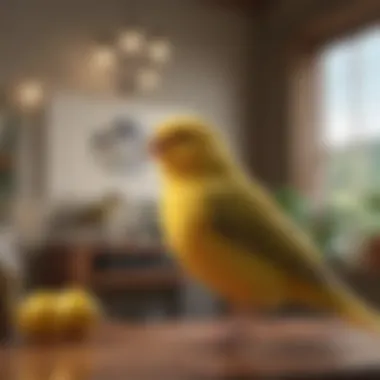
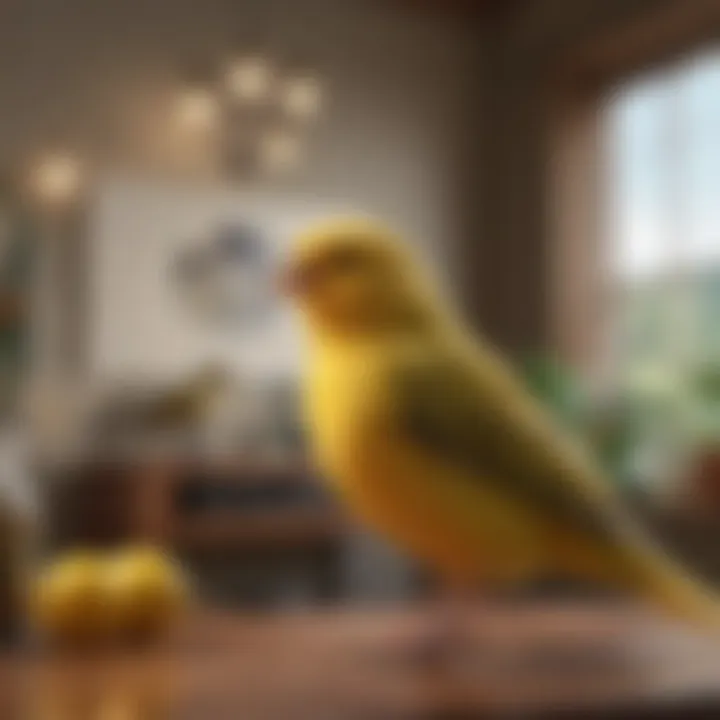
The effort you put in directly translates to your bird's happiness and health.
Nutritional Needs
To keep your feathered companion singing and thriving, one can’t overlook the importance of a balanced diet. Birds have specific nutritional requirements that differ across species. Feeding them a mix of high-quality pellets, fresh fruits, and vegetables is crucial.
- Fresh Foods: Consider foods like leafy greens, carrots, and berries as they provide essential vitamins and minerals.
- Avoid Toxic Foods: Some common foods are harmful to birds, including avocado, chocolate, and caffeine. Always do your research before providing new treats.
- Supplementation: Sometimes, a formulated bird vitamin or mineral supplement may be necessary, especially for breeding pairs, which can add an extra layer of health assurance.
A well-fed bird is a happy bird, and understanding their unique dietary needs will prevent a number of health issues down the road.
Creating a Safe Environment
Safety should always be at the forefront of any pet owner’s mind. A safe living situation greatly contributes to your bird’s quality of life. Not only should their cage be spacious and comfortable, but the environment around it also needs to be carefully curated.
- Cage Requirements: Ensure the cage is the proper size for your bird species. They need enough room to stretch their wings and move about comfortably.
- Toxic Substances: Keep an eye out for any toxic plants or non-bird-safe products that could harm your feathered friend. Household cleaners and certain fumes can be deadly to birds.
- Supervised Freedom: When allowing your bird to roam outside of its cage, ensure the area is bird-proofed. That means removing hazards or dangers like open windows, ceiling fans, and other pets.
"Creating a safe haven for your bird is more than just a cage; it's about fostering an environment where they can thrive."
In essence, the responsibilities of pet ownership run deep. They require dedication, knowledge, and a constant willingness to learn. By investing the necessary time and energy into these little creatures, pet owners not only enhance their welfare but also foster rewarding bonds that can last a lifetime.
Types of Pet Birds
When considering the significance of pet birds in our lives, understanding the types of birds available for ownership is essential. Each species brings its own unique characteristics, personalities, and care requirements, making it crucial for potential owners to match their lifestyles with the right bird. Let’s delve into some popular types of pet birds, highlighting what makes each unique and appealing, as well as considerations for their care.
Parakeets and Budgerigars
Parakeets, specifically budgerigars, or budgies, are among the most beloved pet birds. Their vibrant colors and sociable nature make them a popular choice for many households. In fact, budgies are known for their ability to mimic human speech, delighting their owners with playful antics and sweet sounds.
- Size: Compact and lightweight, generally measuring around 7 inches in length.
- Lifespan: With proper care, budgies can live for 5 to 10 years.
- Social Needs: They thrive on interaction, so consider adopting a pair to keep them company, as their social nature may lead to loneliness if kept alone.
One of the key attractions of budgies is their vibrant personalities and ease of care. However, new owners should remain attentive to their need for social interaction and mental stimulation to ensure a happy and healthy pet.
Cockatiels
Cockatiels are charming little birds known for their friendly demeanor and distinctive crests. These birds often bond closely with their human companions, making them excellent pets for families.
- Size: Medium-sized, reaching around 12 to 14 inches long.
- Lifespan: Can live approximately 10 to 14 years with proper care.
- Vocalization: They are famous for their whistling and can learn to imitate simple melodies.
Cockatiels require a bit more engagement in terms of interaction and mental stimulation. Their playful nature allows for bonding activities like playing games and learning tricks, which can deepen the connection between bird and owner.
Conures
Conures are playful and affectionate birds, known for their spirited personalities. These birds come in various species, such as the sun conure and the green-cheeked conure, each offering a unique experience.
- Size: Ranges from about 10 to 20 inches depending on the species.
- Lifespan: Typically live between 20 to 30 years, a long-term commitment.
- Social Characteristics: Highly social and often need plenty of interaction; they can become quite attached to their owners.
They can exhibit some stubborn behaviors, but with patience and persistence, a strong bond can form. Potential owners should be aware of their vocal tendencies, as many conures are quite loud and boisterous.
Lovebirds
Lovebirds are named for the remarkable connections they exhibit with their partners, whether that be another lovebird or their human companions. They are small yet incredibly expressive.
- Size: Generally around 5 to 7 inches long.
- Lifespan: Can live roughly 10 to 15 years under excellent care.
- Personality: Known for their affectionate behavior, lovebirds often enjoy cuddling and playing.
While they can be content alone with sufficient human interaction, lovebirds might thrive best in pairs. They have a playful spirit and display notable personalities, making them endearing additions to any home.
African Grey Parrots
Considered one of the most intelligent bird species, African grey parrots might surprise you with their remarkable capabilities. Known for their advanced communication skills and high cognitive abilities, they form intricate relationships with their owners.
- Size: Typically between 12 and 14 inches.
- Lifespan: They can live for 40 to 60 years, making them a lifelong commitment.
- Intelligence: Capable of learning a vast vocabulary, often capable of using words in context.
Owning an African grey requires dedicated time for mental stimulation and interaction. Their intelligence also means they can become bored easily, which may lead to behavioral issues if not properly engaged.
"Birds are not just pets; they are family, each with its little quirks and big personalities. Choosing the right type can enrich your life in ways you never imagined."
Selecting the right pet bird involves examining your own lifestyle, the unique traits each bird presents, and their specific needs. Ensuring a good match can foster a rewarding relationship, enhancing both your life and your bird's.
Positive Impacts of Bird Ownership
Owning a pet bird goes beyond just enjoying their beauty or delightful songs; it has far-reaching influences on every aspect of a household. Birds bring unique vibrancy to a home, creating a dynamic atmosphere that is filled with life. Their playful nature and social behaviors can transform the mundane into the extraordinary. Let's delve into how they enhance home life and encourage active lifestyles.
Enhancing Home Life
Pet birds contribute to the overall ambiance of an environment. Their cheerful chirps and songs often fill the silence in a house, making it feel lively. Many bird owners find themselves smiling more often as their feathered companions engage in goofy antics. The act of watching a cockatiel bob its head to music or a parakeet mimic words can provide countless hours of amusement.
Moreover, they are naturally social beings. Birds, like lovebirds and conures, thrive on interaction. This social dynamic can encourage family members to gather around the bird’s cage, fostering connection and meaningful conversations. When a family rallies around their pet bird, it often strengthens interpersonal bonds, creating shared experiences that can be cherished over time.
In addition, having a pet bird often motivates owners to keep a more organized and clean living environment. The necessity of maintaining their cages, toys, and feeding areas encourages a greater awareness of the overall tidiness of the home. Keeping everything in order can lead to a more serene and pleasant living space.
Encouraging Active Lifestyles
Bird ownership can also lead to being more physically active than one might realize. Birds require daily interaction, which often involves considerable movement and engagement from their owners. For instance, engaging a playstand or training area allows the birds to exercise, but it demands action from the owner too. Moving around, encouraging flight, or teaching tricks requires physical presence and energy.
Bird owners often report an increase in outdoor activities as well. Those who may have once been couch potatoes find themselves taking their birds outside to enjoy fresh air. This can manifest in various ways:
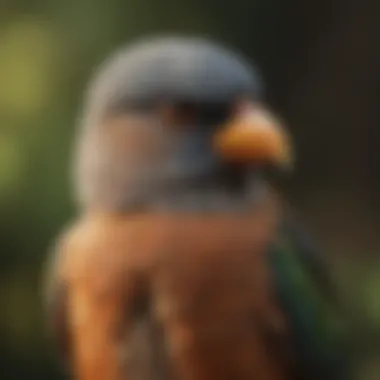
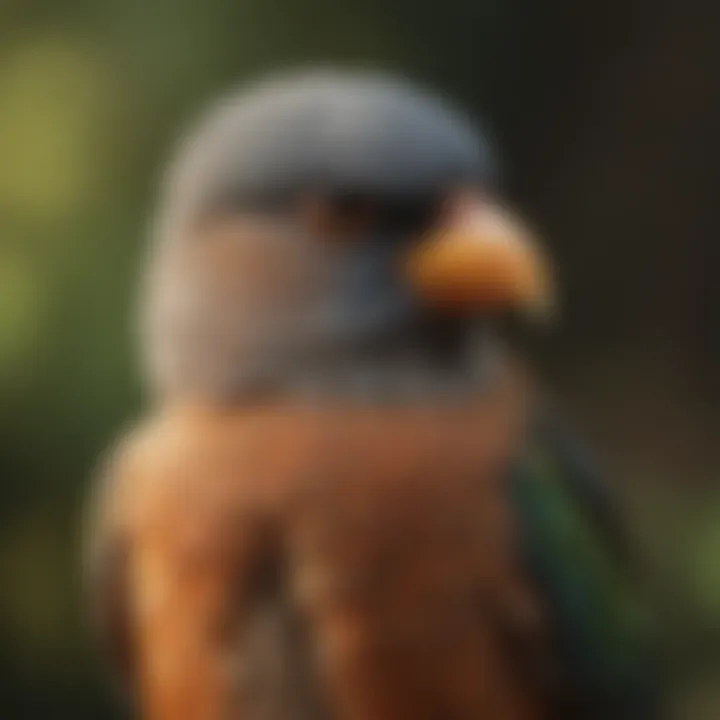
- Walks in the park: Many bird owners enjoy taking their birds outdoors in aviary-appropriate carriers. This not only introduces the bird to nature but also provides fresh air and sunshine for the owner.
- Outdoor events: Bird shows or meet-ups become exciting outings that prompt exploration and meeting like-minded individuals.
- Training sessions: These grow into active pursuits, where tricks can be practiced in the garden or while taking strolls, encouraging movement while forging deeper bonds with the birds.
"Birds inspire not just joy; they spark activity and connection among people."
Overall, pet birds have a profound effect on enhancing daily life and promoting an active lifestyle. Their playful nature nudges us out of our comfort zones, while their need for interaction often results in increased creativity in thinking about how to engage them constructively. For anyone considering the leap into bird ownership, these positive impacts will likely become evident before too long.
Social Interactions and Community
The connections we foster with others who share our love for pet birds create a vibrant tapestry of friendship and support. Pet bird ownership transcends mere companionship; it cultivates a sense of belonging within local and global communities. These social interactions not only enrich our lives but also contribute significantly to our understanding and responsibilities as bird owners. Let's delve into the diverse ways these communities manifest and the impacts they have on individuals and the species they cherish.
Bird Owners' Communities
Engaging in bird owners' communities offers a unique opportunity for sharing experiences and knowledge. These groups can take many forms, from online forums to local clubs and social media circles. For instance, Reddit hosts several active forums where bird enthusiasts post questions, share pictures of their feathered friends, and offer support during tough times.
- Support and Knowledge Sharing: Whether it's troubleshooting behavioral issues, sharing tips for bird care, or simply exchanging heartwarming stories about their birds, these communities can be invaluable resources.
- Connection through Experience: Connecting with individuals who possess a similar passion for birds fosters camaraderie. Members often feel more relaxed discussing their joys and challenges, knowing they are surrounded by like-minded people who understand the nuances of bird ownership.
Bird Shows and Exhibits
Bird shows and exhibits serve as a celebration of avian beauty and diversity while also acting as hubs for connection within the community. Events like the American Birding Expo not only showcase various species but also offer a platform for pet bird owners to interact face-to-face.
- Networking Opportunities: These events provide spaces to meet breeders, trainers, and fellow enthusiasts in person. The in-person interactions can lead to lasting friendships and partnerships, benefiting all parties involved.
- Education on Best Practices: Participants can learn about best practices, disaster preparedness, and conservation efforts. Workshops and demonstrations often accompany these exhibitions, allowing attendees to gain first-hand knowledge about the intricacies of bird care and behavior.
"Community is not just about location; it’s about forging relationships and understanding shared values, especially when we involve our beloved pets in the narrative."
In summary, the social interactions that arise from pet bird ownership play a crucial role in enhancing not only the lives of the owners but also the well-being of the birds themselves. By engaging with communities, whether online or through events, we gain insight, foster new friendships, and build a collective responsibility towards the well-being of our avian companions.
Cultural Significance of Birds
Birds have fluttered through the pages of human history, draping themselves across cultures and symbols. Their significance runs deeper than just being colorful companions; they hold a mirror to human existence, often reflecting our values, beliefs, and aspirations. In our exploration of pet birds, this deep-rooted cultural aspect cannot be underestimated. Looking at how different societies integrate birds into their narratives can provide insight not only into our connections with these creatures but also into the symbolism they carry and how they influence art and literature.
Symbolism in Different Cultures
Across the globe, birds are often intertwined with the fabric of cultural symbolism. In many traditions, they are considered messengers between the earthly and the divine. For example:
- Doves are universally recognized as symbols of peace and purity, often appearing in religious texts and ceremonies. Their gentle cooing and graceful flight have made them emblems of love.
- Eagles, on the other hand, rise to represent strength and freedom. In the United States, the bald eagle symbolizes courage and resilience, embodying the spirit of the nation itself.
- Owls, with their nocturnal ways, are often seen as omens of knowledge and wisdom, frequently depicted in mythology as guardians of sacred truths.
Each bird species carries its own narrative, and the way it's viewed often aligns with the qualities attributed to it by contrasting cultures. This speaks not only to the elegance of these avian creatures but also to the layers of meaning humans have attached to them throughout history. Just think about it; how often do we refer to someone as being 'eagle-eyed' or consider a fallen bird as a bad omen? These phrases are borrowed from our deep-rooted cultural understandings.
Birds in Literature and Art
Birds have not only flown into our hearts but have also nested firmly within literary and artistic expression. Across centuries, poets and authors have often harnessed the flight of birds to signify freedom, beauty, and even the fleeting nature of life. Consider the following:
- Poetry, such as the works of John Keats or Emily Dickinson, frequently flit through images of nightingales and sparrows, using these birds to encapsulate themes of love, longing, and sorrow. Dickinson, particularly, emphasizes the ephemeral presence of these creatures to depict the transient nature of existence.
- Visual arts have also drawn inspiration from avian forms. Artists like John James Audubon dedicated their lifetimes to capturing the beauty of birds in nature, blending art with ornithology, showing the intricate details of feather patterns alongside the broader strokes of landscapes.
- The presence of birds in folklore, fairy tales, and fables further shows their multidimensional reputation. From the wise crow in Aesop’s tales to the mythical phoenix rising from ashes, birds often symbolize transformation and hope.
In summary, the cultural significance of birds is rich and varied. They connect with our emotions and thoughts, reflecting hopes, dreams, and ideals across diverse societies. With the companionship of pet birds, we not only nurture a living being but also engage in a relationship that echoes a timeless tradition. They serve as reminders of our humanity, tying us into the wider narrative of existence that birds have been part of since time immemorial.
Challenges and Considerations
Navigating the world of pet birds isn't all sunshine and rainbows; there are real challenges and considerations to think about. Understanding these aspects is crucial for anyone thinking about bringing a feathered friend into their home. From behavioral quirks to the long-term commitment, the road to successful bird ownership requires careful planning and consideration. This section aims to shed light on the potential obstacles so that aspiring bird owners can prepare adequately.
Behavioral Issues
Birds, like any other pets, come with their own set of behavioral characteristics that can pose challenges. It's important to recognize that birds are social creatures and thrive on interaction. A lack of socialization can lead to various behavior problems, such as excessive screeching, biting, or feather plucking. Additionally, some species have unique habits that may require special attention. For instance, cockatiels are known for their affectionate nature, but they can become clingy and can develop separation anxiety if not properly managed.
To address behavioral issues effectively, it's essential to provide regular mental stimulation and social interaction. Here are a few strategies:
- Daily interaction: Spend time talking, training, or just being near your bird.
- Enrichment activities: Introduce toys and challenges that engage your bird mentally and physically.
- Positive reinforcement: Reward calm behavior to encourage good habits.
"A well-socialized bird is a happy bird; without interaction, they can easily turn into little troublemakers."
Understanding these behavioral challenges not only helps in managing any issues that arise but also enhances the overall bond between you and your feathered friend.
Long-Term Commitment
When it comes to pet birds, commitment is a crucial aspect that cannot be overstated. Unlike a goldfish, which typically has a lifespan of a few years, many species of birds can live for decades. For example, African grey parrots can live up to 50 years or more when properly cared for. This longevity means that prospective owners need to be prepared for a long-term relationship that requires consistent commitment.
Here are some factors to consider regarding long-term ownership:
- Living situation: Your lifestyle and living arrangements should be conducive to having a bird. For instance, will you be moving often? Some birds do not adjust well to frequent changes.
- Financial implications: Birds can require a significant financial investment over their lifetime, from purchasing high-quality food to routine vet check-ups and possible medical needs later on.
- Lifestyle changes: As life evolves, so do responsibilities. Having a bird requires the capacity to make adjustments to your daily routine, especially if there are changes in your job or family structure.
It's vital to weigh both your current situation and your future plans when considering a pet bird. By doing so, you can be assured that you're making a responsible and informed decision that benefits both you and your avian companion.
Future of Pet Bird Ownership
The future of pet bird ownership carries immense significance in today's society. As we look ahead, various factors play pivotal roles in shaping how pet bird owners and aspiring bird parents engage with their feathered companions. Understanding these elements not only enhances owner experiences but also impacts bird welfare and the ecological context we live within.
Sustainable Practices
Sustainability is a word that gets tossed around a lot these days, but for bird owners, it carries a special weight. The lasting care of pet birds hinges on practices that respect both the animal itself and the environment. More folks are becoming aware that incorporating sustainable practices into their bird care routines can make a difference.
- Environmentally Friendly Products: Using non-toxic, sustainable toys and accessories can keep your feathered friend safe while minimizing environmental damage. Brands like Avian Avenue offer products that prioritize eco-friendliness.
- Natural Diet Choices: Shifting toward organic bird feeds not only supports your bird’s health but can also reduce the carbon footprint associated with mass farming.
- Reducing Waste: Implementing a waste-reduction strategy, like reusing bird-safe packaging for toys or nesting material, can contribute to a greener home for your bird.
Incorporating these sustainable strategies into everyday care can help ensure that future generations of birds thrive in a healthier environment.
Conservation Efforts in Aviculture
Amid the growing awareness of environmental issues, conservation within aviculture is no longer an afterthought; it has become an urgent necessity. Many species are facing habitat loss and population decline, and pet bird owners have a unique role to play in their conservation.
"Pet ownership can be a conduit for awareness and action, transforming personal passion into global impact."
- Education: A responsible pet owner understands the significance of their bird, both as a pet and a representative of wild populations. Teaching others about the risks these species face—like habitat destruction—can foster a sense of responsibility beyond personal ownership.
- Support Conservation Organizations: Contributing to organizations that focus on avian conservation, such as the World Parrot Trust, can provide funds and awareness for on-ground efforts protecting species.
- Responsible Breeding Practices: For those involved in breeding, following ethical practices can prevent the over-exploitation of birds in the wild, ensuring species remain viable and healthy for the long-term.
Through such efforts, pet bird ownership can shift from a mere hobby to a powerful movement contributing to the well-being of avian species worldwide. Overall, embracing these principles will help form a conscientious community of bird lovers who truly understand the depths of their commitment to these magnificent creatures.















